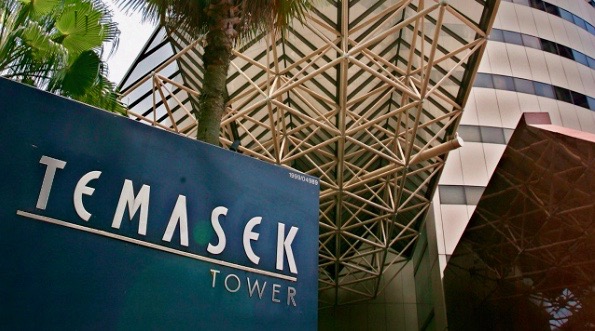ASIA MEDIA REPORTS – The Temasek Dialogue ‘breakfast club’ invited Asia Media International editor-in-chief Tom Plate to discuss and defend his perspectives on the roiling U.S.-China relationship. Temasek Holdings is one of Singapore’s two sovereign wealth funds, and is a major shareholder in the city-state’s biggest firms, including Singapore Airlines and Singapore Telecom. In March Singapore’s state investment giant Temasek reported the value of its global portfolio at a record high of Sg$215 billion ($169 billion) in the year thanks to a rebound in stock markets. The firm said in a statement its holdings jumped 8.6 percent from the previous financial year, and are now more than three times larger than at 10 years ago.
On 23 May, about two dozen members of Temasek’s high-level ‘issues’ club met with Professor Plate, who is LMU’s Distinguished Scholar of Asian and Pacific Studies, and LMU Senior Vice President Dennis Slon, for ninety minutes. Both — graduates of American public policy schools — were in Singapore (and then to Jakarta) to spend some time with the university’s many distinguished and accomplished alumni in the region.
The session was moderated by Mr Cheong Yip Seng, former editor-in-chief of Singapore Press Holdings’ English and Malay Newspapers Division, and author of OB Markers, considered one the most incisive books on the relationship between government and the news media. Below is a list of the topics on China discussed that morning, as released by Temasek Dialogue by its members (and slightly redacted by Prof Plate to insure the appropriate confidentiality of some of the comments).
American Perceptions of China:
– In Washington today, no good word about China may be said. You are either for or against China in the US.
– American media sees every Xi move e.g. term limits, from the perspective of Mao.
– It is worrying how the American media has developed a certain image on China given that wars in the past, e.g. with Iraq, have been whipped up by media sentiment in the US.
– Even reputable academics such as those from Harvard e.g. Graham Allison are writing about a war between the US and China. The sentiment within the US was such that even Henry Kissinger is considered ‘left-wing’ for his China views.
– America needs to transform its attitude towards China, and it needs to treat China as special. China’s history is unique with the suffering of its people in the past, to now a rich nation. It is very important to treat China with respect. Americans should understand the history of China before they make any judgement but the lack of respect by the US towards China is evident on issues such as trade.
– American media has an important role to play in shaping US perception of China but the media only came to realize the full dimensions of China’s success story in the mid-2000s as it was preoccupied with the Middle East before that, even though China has been opening up since 1978. In that regard, the US media is still in a sense of shock and denial about China’s rise.
– Is China helping herself be understood? Think tanks in China helps to position China in a positive light, but the government has also not been explaining themselves well as Chinese official communication tends to uses robust language and slogans. Even domestic Chinese think the government is not communicating effectively to the outside world.
– The lack of effective communication has been compounded by a sense of arrogance. Even so, China is still some way behind the US. As observed to Plate by a senior executive, China would only have arrived if the cream of the crop in China preferred to remain in the country instead of going to the US to work or to study.
– The Chinese government had sought advice about how to improve its image in the US in the early 2000s. Plate suggested that the government changes its policies e.g. on human rights so as not to make martyrs out of its dissidents. China should also tell good stories about itself – e.g. on the environment as there were many in the US who felt that China would not be able to solve its environmental problems. China should also paint a new picture of itself – e.g. with the 2008 Olympics.
– US and Russia had a challenging relationship over many years. Would this be an indication of the relationship between the US and China? 1989 was a great success for US foreign policy but the US has not learnt from history. Unlike with the former Soviet Union, the US has no conceptual framework towards China and instead has been
‘imprisoned’ by the past.
– Taiwan Relations. It is not clear whether the US would intervene on the behalf of Taiwan as it was not clear where the red line stood in relation to the US. The US had acted carefully in the past. In 1996, the US had sent two US carrier teams to Taiwan in response to missile tests by China but then President Clinton had made it a point not to send the carriers through the Straits of Taiwan on the advice of the US Ambassador in Beijing so as to avoid further provoking the Chinese. Hopefully, the Trump Administration will be smart about this as well.

